British Prime Minister Rishi Sunak announced the cancellation of 2035 carbon emission target?
Ming Inspector Tao Yadi
- Misleading online myths, UK Prime Minister Rishi Sunak announced in September last year that he would postpone the implementation of an environmental policy until 2035, namely a ban on new petrol and fuel vehicles, in order to alleviate the economic pressure on the British people in the short term. This may be the source of the net's lore. The UK still plans to achieve Net Zero by 2050.
- There is no empirical evidence that Germany and Denmark have already scrapped carbon neutrality, which may be due to a misreading of the German policy revision bill and a misrepresentation of the statements of officials in Copenhagen, respectively. At present, the governments of these two countries have not officially announced the cancellation of carbon neutrality.
Background to the event
Recently, a news circulated on social platforms that said, "Following the withdrawal of Germany and Denmark from carbon neutrality, on January 18, British Prime Minister Sunak announced: The UK will cancel its 2035 carbon emission target." Sunak also said: "We are not going to save the planet by bankrupting the British people. ”
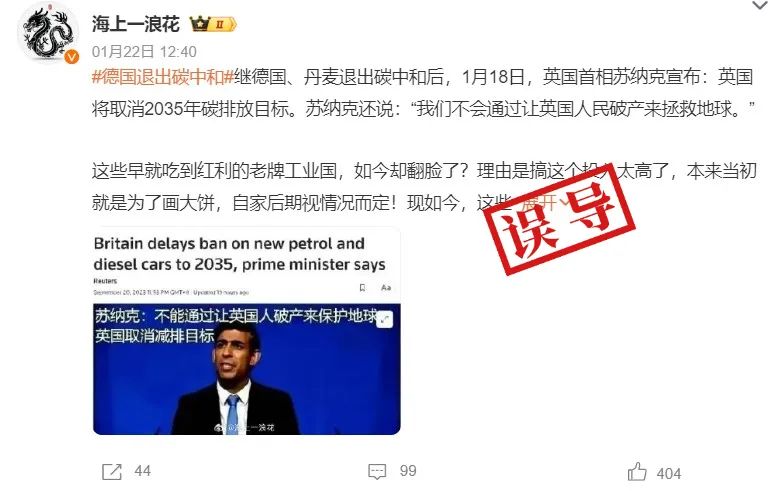
Screenshot of the Internet legend method
Check clearly
The British Prime Minister announced the scrapping of the 2035 carbon emission target?
According to the online picture, the English content of the picture is a report released by Reuters, and the headline says, "The British Prime Minister said that the United Kingdom will postpone the ban on new gasoline and fuel vehicles until 2035." However, the Chinese translation of the picture is inconsistent: Sunak said the planet could not be protected by bankrupting the British, and the UK scrapped its emissions reduction target.
According to verification, Reuters did publish a report on September 28, 2023 that Sunak postponed the ban, combined with British media reports, Sunak said that the five-year extension of this policy is aimed at protecting "struggling British households" from "unacceptable costs", "He remains committed to achieving net zero emissions by 2050, but this transition can be done in a 'fairer and better way'." ”
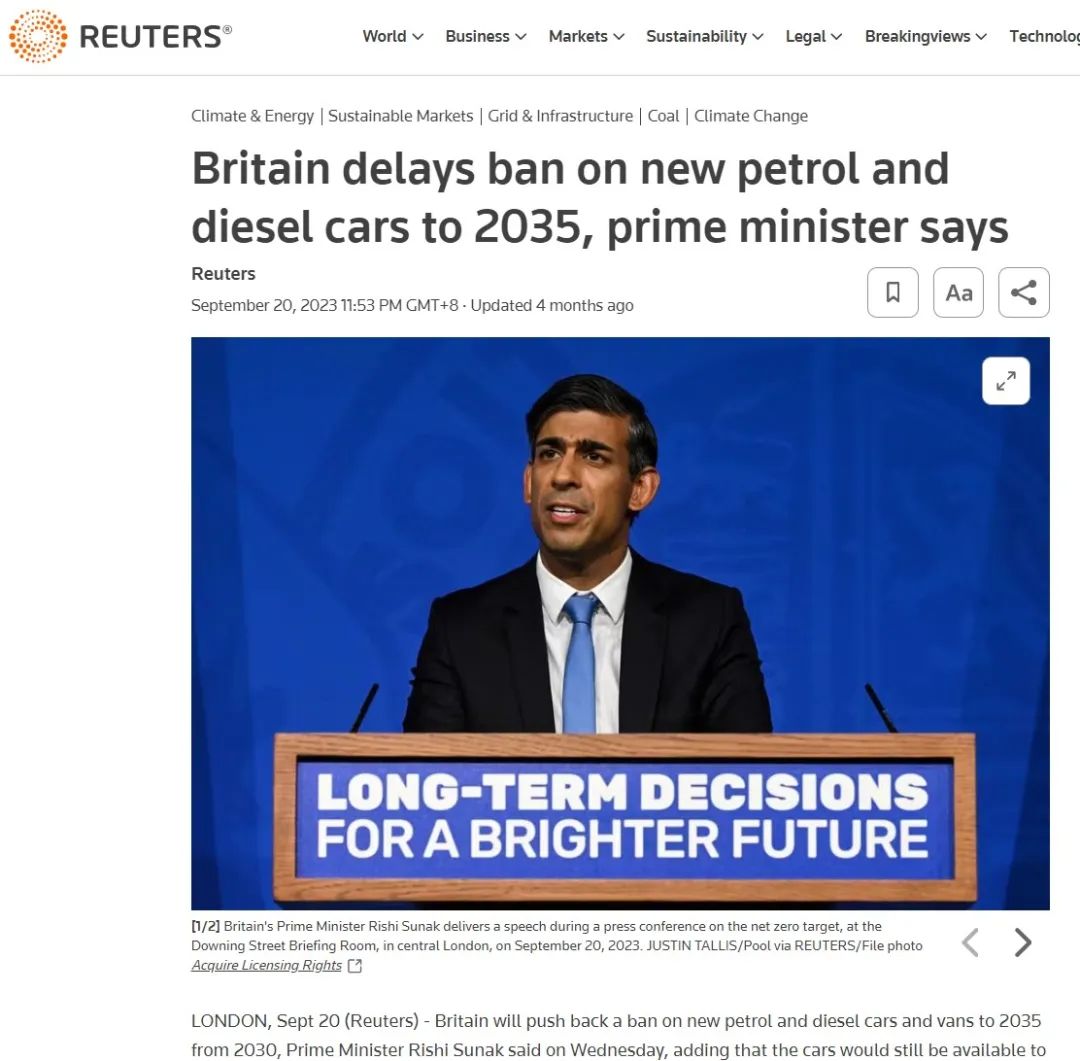
The screenshot of the original text of the 2023 report shown in the online picture does not match the actual content of the online legend.
In September 2023, around the ban and other plans to dilute green policies, former British Home Secretary Suella Braverman said in an interview with the media, rejecting the view of politicians that the government intends to abandon the net zero commitment, but at the same time, she said, "We must take a pragmatic approach, an approach that is modest and serves the goal, and we will not save the planet by bankrupting the British people." "Putting economic interests first, putting the interests of British workers first, putting the interests of families first, that's how we grow the economy. ”
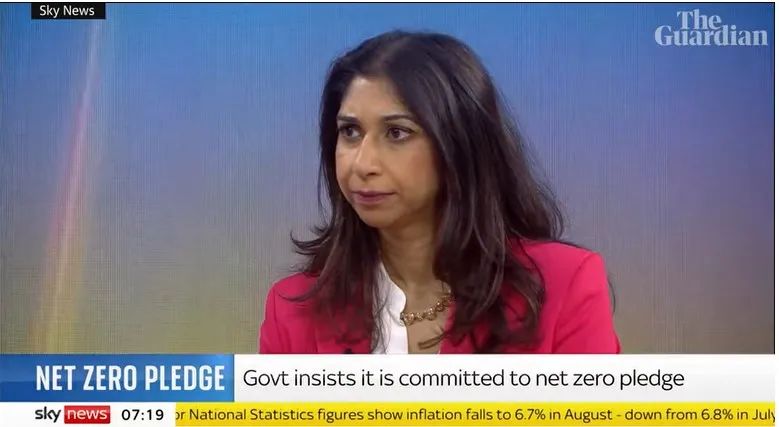
Former Home Secretary Suella Braverman stressed in an interview last September that the government is sticking to its net-zero target
Separately, according to the UK government's November 2023 report "UK Plans and Progress to Achieve Net Zero Targets by 2050", the UK postponed the target year of some of its emissions reduction policies to 2035 last year, including a ban on the installation of oil-fired and LPG boilers from 2026 to 2035, in addition to the ban on new petrol and diesel vehicles. This is the exact opposite of the online rumor that the carbon emission target will be abolished.
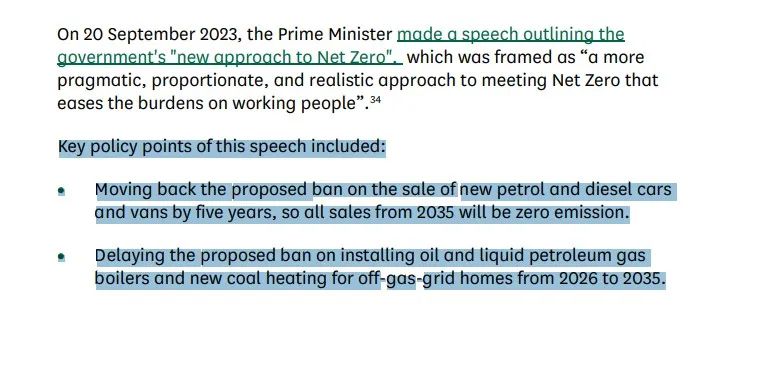
Screenshot of the briefing on "The UK's plans and progress towards net zero by 2050".
Sunak's delay in reducing carbon emissions has been controversial, not only for environmentalists and the auto industryprotestSome Conservatives are also opposed. 《Washington post"With a general election coming up next year (2024), Sunak and the Conservatives may think they can improve their chances of winning by delaying climate action that affects people's personal lives and wallets." However, Sunak has publicly denied that the approach has anything to do with the election, saying he already had the policy in mind before taking office. According to a poll released on January 22, 2024, the current Conservative Party's support (24%) is still lower than that of its biggest rival, Labour (45%).
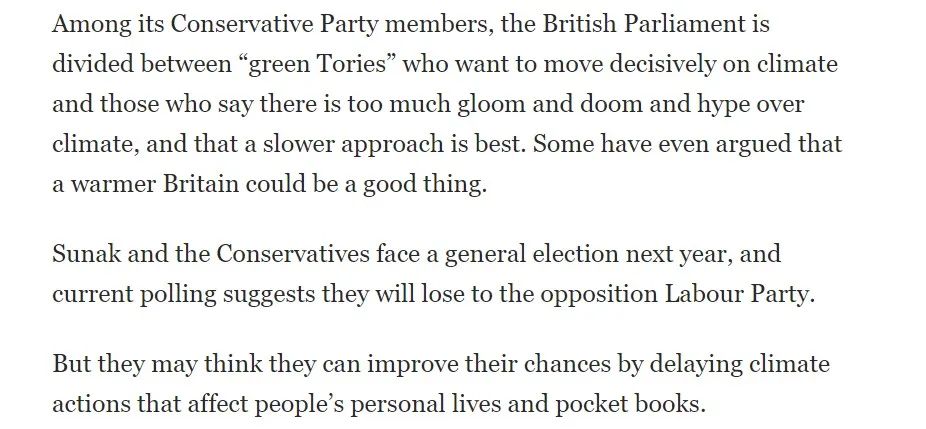
There are reports that Sunak may have adopted the policy in order to boost his approval ratings.
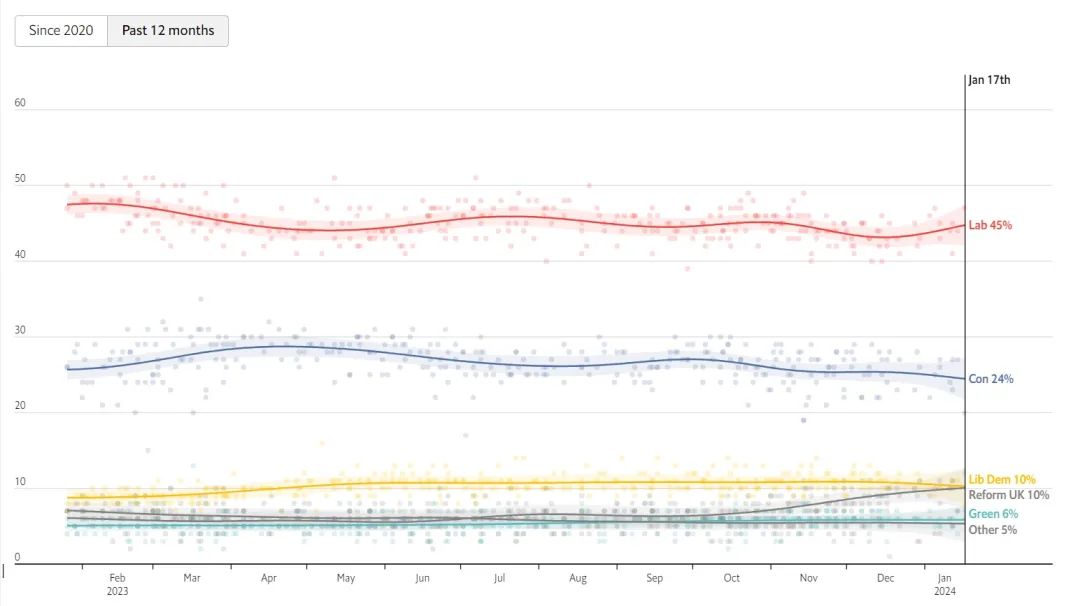
Poll statistics for January 22 of this year
Germany and Denmark have long since withdrawn from carbon neutrality plans?
Carbon neutrality, sometimes referred to as climate neutrality, was originally defined as achieving a balance between greenhouse gas emissions and absorption on a global scale. According to the World Economic Forum, carbon neutrality is a different action than the net zero action mentioned above, which is necessary to combat climate change, carbon neutrality can often be used to calculate carbon dioxide emissions, but does not include other greenhouse gas emissions, while net zero means that companies reduce all greenhouse gas emissions throughout their supply chain.
A search for the "Germany's exit from carbon neutrality plan", which has been widely circulated in July 2022, may have stemmed from a misreading of a Reuters article titled "Draft law shows Germany plans to revise key emissions targets for the energy sector".
The report said that Germany's ruling coalition will revise a key climate change target, which is to "achieve carbon neutrality in the energy sector by 2035". The change has also been reported by a number of German media outlets.

Screenshot of the Reuters report
The draft, entitled "Draft law on emergency measures to accelerate the expansion of renewable energies and other measures in the electricity sector", is part of the "Easter package" presented by Germany in 2022. At that time, the plan included a large number of policy amendments to various laws and regulations such as the German Renewable Energy Act and the Energy Industry Act.
On July 6, 2022, the German parliament issued a statement on the draft, which stated that the details of the 2035 target are "as early as 2035, domestic electricity generation should be almost greenhouse gas neutral, that is, almost exclusively generated from renewable energy." The Climate Protection and Energy Committee decided to remove the target of "neutrality of greenhouse gas emissions by 2035" and change it to "once the phase-out of coal is completed, greenhouse gas neutrality in the electricity supply will be achieved, and the further expansion of renewable energy will be driven by the market". It can be seen that the draft refers to the 2035 target for power generation, not for the entire German carbon neutrality plan.
In fact, Germany's national-level carbon neutrality target is planned to be achieved by 2045, and this macro node has not changed.

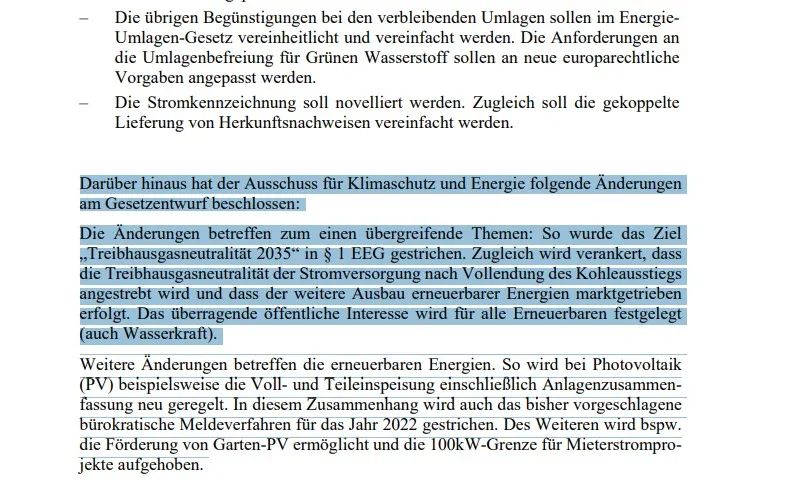
Screenshot of the draft law on emergency measures to accelerate the expansion of renewable energy sources and other measures in the electricity sector
According to the latest status of the draft, it adopted a resolution of the German Bundestag.
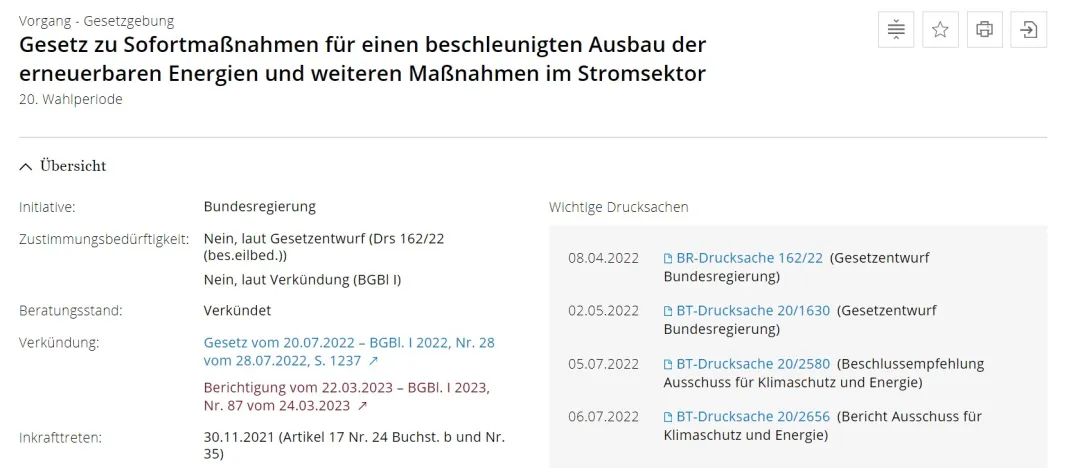
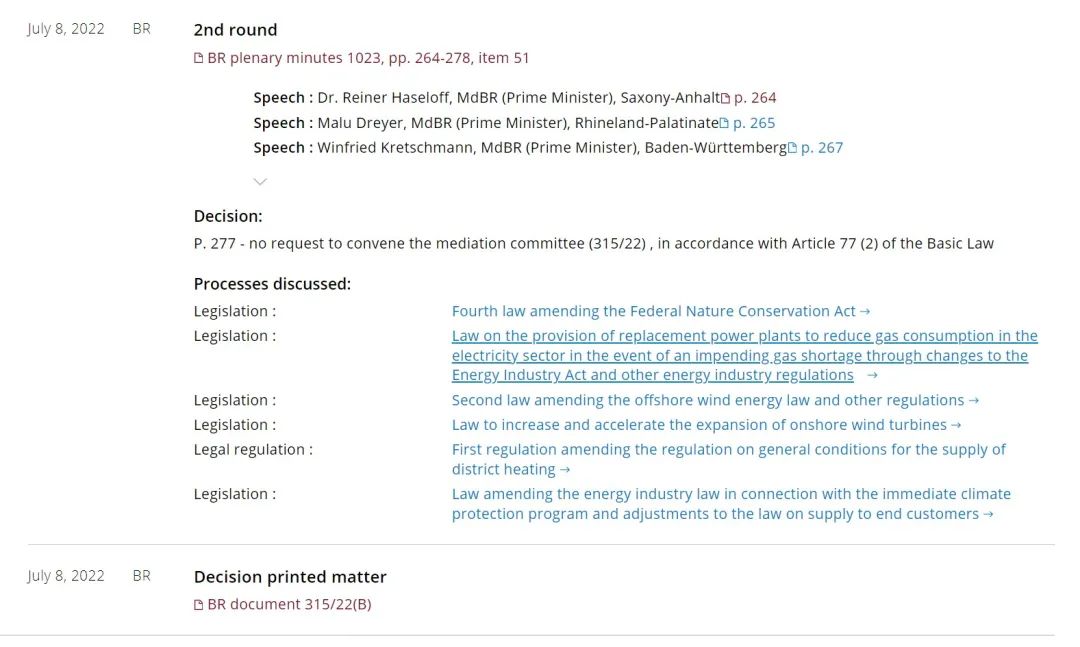
The status of the draft in the German parliament is shown as "published", and the last resolution was published on July 8, 2022
In addition, there is no official information that Denmark has scrapped its 2050 target to achieve carbon neutrality. It is possible that the claim originated from a speech in August 2022 by Line Barfod, the head of technology and environmental affairs in the Danish capital Copenhagen. According to Danish media reports, Line Barfod said that it may not achieve its goal of "becoming the world's first carbon neutral capital by 2025", citing reasons such as local incineration plants not meeting Danish Energy Agency regulations and insufficient funding to reduce emissions, but at the same time she said she will continue to work hard to achieve this goal as much as possible. At present, the Copenhagen government website does not make any changes to the plan to become the world's first carbon-neutral capital by 2025.
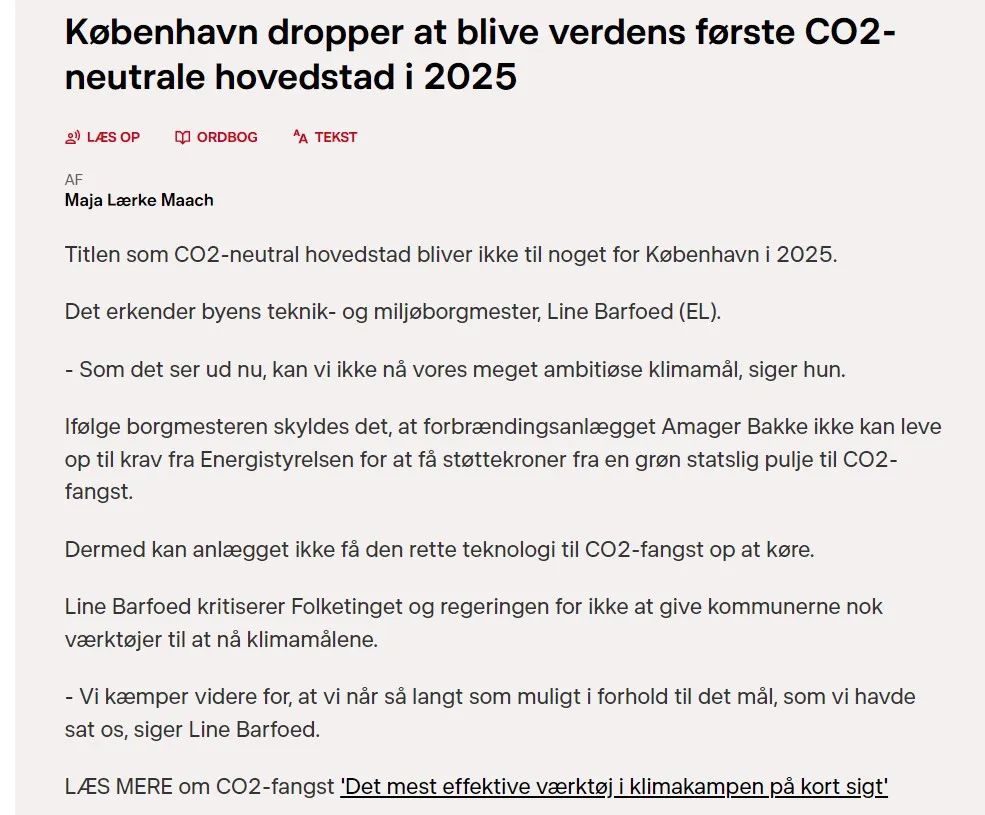
Screenshot of Danish media coverage
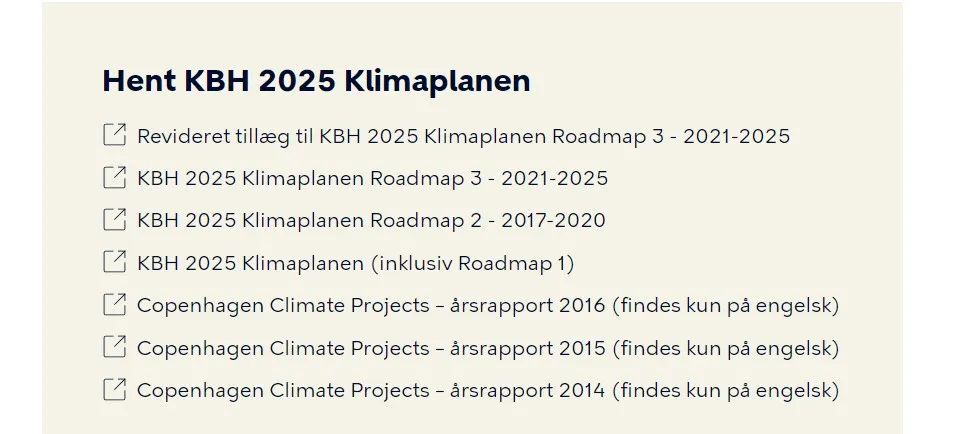
The Copenhagen government website still lists 2025 as a key milestone in the annex.
In summary, the online rumors are misleading, and British Prime Minister Rishi Sunak announced in September last year that he would postpone the implementation of an environmental policy until 2035, namely the ban on new petrol and fuel vehicles, in order to alleviate the economic pressure on the British people in the short term. This may be the source of the net's lore. The UK still plans to achieve Net Zero by 2050. There is no evidence that Germany and Denmark have long since eliminated carbon neutrality, and it may be due to a misreading of Germany's renewable policy revision bill and a misrepresentation of statements made by officials in Copenhagen, respectively. At present, the governments of these two countries have not officially announced the cancellation of carbon neutrality.







